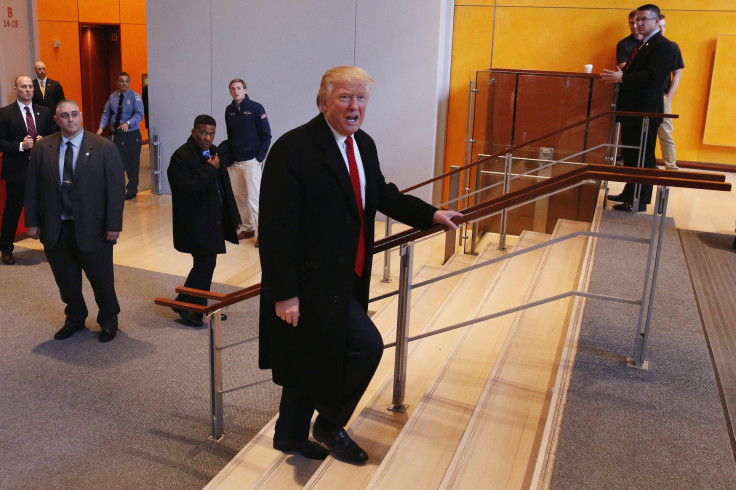Donald Trump's Latest Transition Controversies: 'Self-Dealing,' Conflicts Of Interest, Neo-Nazis

The transition into the presidency for President-elect Donald Trump has been rife with scandal. The latest controversies Tuesday involved everything from Trump's foundation flouting charity laws to wide-ranging conflicts of interest involving the real estate mogul's business interests.
The Washington Post, which closely tracked Trump's foundation during the election cycle, first reported the bombshell news that the foundation had admitted to "self-dealing" on an Internal Revenue Service form. Self-dealing rules prohibit those in charge of nonprofits from using charity money to help themselves, their family, or their business interests. The penalty for self-dealing could be as high as three times the amount the person benefited from, a law expert told USA Today.
Trump could also reportedly face further penalties from state agencies as the office of New York Attorney General Eric Schneiderman has been investigating the foundation. On Friday, Trump agreed to a $25 million settlement in a fraud case against Trump University, which involved a lawsuit from the New York attorney general.
NEW: @realDonaldTrump's charity tells IRS it broke "self-dealing" rules in '15, also did so in past w/o reporting it https://t.co/EGUGjxOiZr
— David Fahrenthold (@Fahrenthold) November 22, 2016
Trump's bevy of business interests have raised growing concerns about conflicts of interest as president. His adult children, particularly his oldest daughter Ivanka Trump, continue to attend meetings with world leaders, despite the fact that the adult Trump children are reportedly set to control the real estate mogul's interests during his presidency.
Ivanka Trump was reportedly on a phone call between Donald Trump and Argentina's President Mauricio Macri, just days after she drew criticism for sitting in on a meeting between the president-elect and Japanese Prime Minister Shinzo Abe.
Donald Trump has seemingly kept other ties to his businesses, meeting with Indian business partners during the transition, as foreign diplomats are reportedly rushing to book rooms in a Trump property to gain favor with the president-elect. Dispatches on Twitter from a meeting between Trump and the New York Times appear to show he is relatively ambivalent toward these purported conflicts of interest.
"The law's totally on my side, the president can't have a conflict of interest," Trump said, according to New York Times reporter Maggie Haberman. The president-elect reportedly confirmed in the Times meeting that his Washington, D.C., hotel was doing better after his election-night win and that he may have brought up wind farms that affect his United Kingdom businesses in a meeting with British politician Nigel Farage.
Despite Trump's lack of concern, a number of typically conservative-leaning outlets have called for him to wholeheartedly remove himself from his businesses. The Wall Street Journal's editorial board urged him to liquidate his stake in the family businesses, while the New York Post, which supported Trump, said he should put his businesses in a truly blind trust not run by his children.
Trump on his businesses/conflict q's: "The law's totally on my side, the president can't have a conflict of interest."
— Maggie Haberman (@maggieNYT) November 22, 2016
Trump acknowledges the DC hotel he owns is "probably a more valuable asset than it was before." Says the brand is "hotter."
— Maggie Haberman (@maggieNYT) November 22, 2016
"I might have brought it up," Trump says of Farage meeting and wind farms.
— Maggie Haberman (@maggieNYT) November 22, 2016
"In theory I could run my business perfectly and then run the country perfectly. There's never been a case like this,"he says of his tangles
— Maggie Haberman (@maggieNYT) November 22, 2016
Another recent controversy concerned Neo-Nazi supporters of Trump, who were videotaped at a Washington, D.C., gathering yelling "Hail Trump" while giving the Nazi salute. It was an event organized by Richard Spencer, who runs the National Policy Institute, which claims to be a so-called "alt-right" think tank.
The Trump camp responded by saying the president continued to denounce racism but did not mention the gathering or alt-right by name. He did reportedly say in the Times meeting that the alt-right is "not a group I want to energize."
But concerns linger over Trump's connection to the so-called alt-right, a group proven to be rife with white nationalists. Trump's choice as his top strategist, Steve Bannon, previously ran the website Breitbart, which Bannon had described as a platform for the alt-right.
Trump on alt-right supporters: "It's not a group I want to energize. And if they are energized I want to look into it and find out why."
— Maggie Haberman (@maggieNYT) November 22, 2016
© Copyright IBTimes 2024. All rights reserved.






















